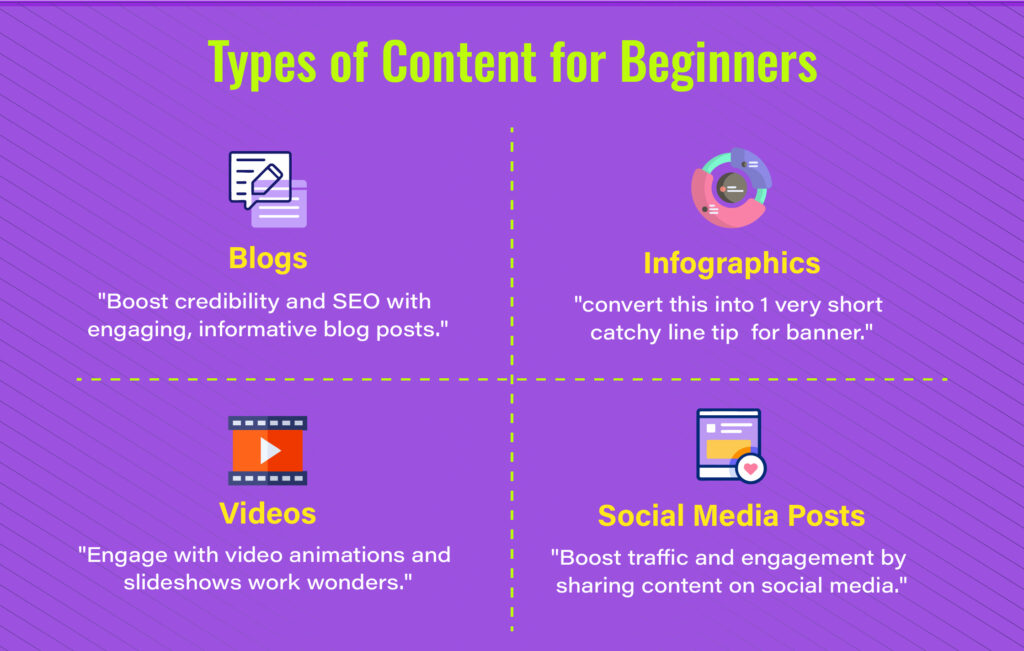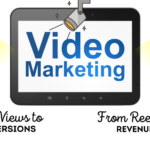[Disclosure: This post may contain affiliate links. If you click on one of these links and make a purchase, we may earn a commission at no extra cost to you. We only recommend products we believe will add value to our readers. For more info read our full Affiliate Disclosure]
What if your business could attract a loyal audience without constant effort? Sounds like a dream, right? Well, that’s exactly what content marketing can do! Whether you’re a new entrepreneur or a seasoned brand, mastering content marketing is the key to building long-term success. In this guide, we’ll break down its essential strategies—from planning and creation to execution and tracking—so you can take advantage of the power of content marketing to grow your brand. Ready to dive in? Let’s get started with content marketing for beginners.
What is Content Marketing?
Content marketing is primarily about connecting and telling stories. It’s more than just putting out blog posts, it’s crafting pieces that resonate, engage, and inspire action. Simply put, content marketing is about creating and sharing valuable, relevant, and consistent content to attract and retain a clearly defined audience—and ultimately, to drive profitable customer action. Forget pushy sales tactics; content marketing is all about building relationships and establishing yourself as a trusted expert in your field.
Benefits of Content Marketing?
Engaging with content marketing offers numerous benefits that can elevate your business:
- Builds Brand Awareness: Consistent, high-quality content helps people discover and remember your brand.
- Drives Organic Traffic: Search engines love fresh, relevant content, leading to higher rankings and more website visitors.
- Establishes Authority: By providing valuable information, you position yourself as a leader in your industry.
- Nurtures Leads: Content can guide potential customers through the sales funnel, building trust and encouraging conversions.
- Improves Customer Engagement: Interactive content keeps your audience engaged and coming back for more.
Types of Content for Beginners

Content marketing isn’t one-size-fits-all. Different formats resonate with different audiences. Here are some content types to consider:
Blogs
Blog Posts are a timeless yet powerful tool for any content strategy. They not only help your website show up higher in search results but also build your credibility and provide value to your readers. To make your blog posts effective, focus on creating informative, well-researched content that’s easy to read. Use compelling headlines to grab attention, and be sure to update your posts regularly to keep them relevant.
Videos
The importance of video content has never been greater than it is today, thanks to platforms like YouTube and TikTok. If you’re camera-shy, animations or slideshows can work wonders too. Videos help convey your message in a more engaging manner.
Infographics
Infographics turn complex information into simple, eye-catching visuals. They’re great for sharing on social media and help your audience understand complicated topics more easily.
Social Media Posts
Social media can help spread your content to a wider audience. Regular posts with links to your blogs, videos, or infographics can boost traffic and engagement.
Distribution Channels: Where to Share Your Content
Creating content is just the first step. The real key is knowing where and how to share it so it reaches the right audience. Using these distribution channels effectively will help ensure your content reaches your audience and drives meaningful engagement. Let’s look at some of the most effective ones:
- Social Media Platforms: Different platforms attract different audiences and suit various content styles. Here’s a quick guide to help you decide where to focus:
- Instagram: Ideal for visuals, stories, and behind-the-scenes content.
- LinkedIn: Perfect for professional insights, industry news, and networking.
- Twitter: Best for quick updates, trending topics, and real-time engagement.
- Email Marketing: Even with social media’s popularity, email is still a powerful tool for affiliate marketers to reach audience directly. Build a subscriber list and regularly send valuable content, updates, and exclusive offers. This keeps your audience engaged and strengthens your relationship with them.
- Your Website: Your website is the home base for your content. Blog posts, videos, and other resources should all live here. Make sure your site is easy to navigate, visually appealing, and optimized for search engines so that visitors can easily find the information they need. Regularly update your site to reflect the latest content and keep it relevant.
Your First Steps: Creating a Winning Content Marketing Strategy
Developing a solid content marketing strategy is like planning a journey—you need a map, a clear destination, and a good grasp of your route. With this plan, you’re well on your way to developing a content marketing strategy that attracts, engages, and converts your target audience. Here’s how to chart a course that will guide your brand toward success:
1. Set Clear Goals: What Are You Aiming For?
Are you trying to increase brand awareness, generate leads, or boost customer loyalty? Your goals will define the kind of content you create. Consider these key objectives:
- Raise brand awareness
- Engage your audience
- Increase website traffic
- Drive sales or conversions
2. Define Your Target Audience: Who Are You Trying to Reach?
If content is king, understanding your audience is queen. Dive deep into:
- Demographics: Age, gender, location, etc.
- Psychographics: Interests, values, and lifestyle choices.
- Pain Points: What challenges can your content help solve?
For example, if you’re selling organic baby food, your audience is likely parents of young children who prioritize healthy eating. Understanding this will help you craft content that resonates.
3. Conduct Keyword Research: Finding Your Audience Online
What are people searching for that relates to your business? Use tools like Google Keyword Planner, Ahrefs, and SEMrush to identify relevant keywords. For our organic baby food example, potential keywords could be:
- “Organic baby food recipes”
- “Best organic baby food brands”
- “Healthy baby food delivery”
4. Establish Content Pillars: Build a Strong Foundation
Choose 3-5 core topics that are central to your business and expertise. These will form the backbone of your content strategy. For organic baby food, the pillars might be:
- Baby food recipes
- Nutrition for babies
- Safe food handling practices
5. Create a Content Calendar: Stay Organized
Planning content in advance ensures consistency and variety. Use a content calendar to map out blog posts, social media updates, videos, and infographics. This roadmap will help you cover essential topics and keep your strategy on track.
6. Craft High-Quality Content: Where the Magic Happens
Now it’s time to put pen to paper—or fingers to keyboard! Create content that’s informative, engaging, and meets your audience’s needs. Make sure it’s well-researched, easy to read, and includes relevant keywords to help it rank better in search results.
7. Promote Your Content: Don’t Let It Sit Unseen
Great content deserves an audience. Share it through social media, email marketing, and other channels. Think of it like hosting a grand party—invite people to make sure it’s a success!
Measuring Success
Understanding whether your content marketing efforts are paying off is essential for long-term success. To do this effectively, you need to track your performance through specific metrics.
- Key Performance Indicators (KPIs): Identify metrics that align with your goals. Here are some important KPIs to track:
- Traffic: Are people visiting your website?
- Engagement: Are they interacting with your content?
- Conversions: Are they taking desired actions, such as signing up for a newsletter or making a purchase?
- Feedback and Iteration: Encouraging feedback from your audience is key. Don’t hesitate to adjust your strategy based on their input. You can continue to improve your content marketing efforts by learning from your past efforts.
FAQs About Content Marketing For Beginners
1. What is the primary goal of content marketing?
The primary goal is to attract and engage a specific audience by providing valuable information that encourages action, such as making a purchase or sharing content.
2. How often should I publish content?
There’s no one-size-fits-all answer, but consistency is crucial. Aim for a regular schedule whether it’s weekly, bi-weekly, or monthly, depending on your resources.
3. Can I do content marketing without a big budget?
Absolutely! Many successful content strategies rely on creativity more than dollars. Focus on quality content and use free platforms for promotion.
4. How do I know which type of content is best for my audience?
Try out different types of content and use analytics to find out what your audience likes best. Look at engagement metrics to help shape your strategy!
5. What tools can I use for content marketing?
Tools like WordPress for blogging, Canva for graphics, and Hootsuite for scheduling can boost your content marketing efforts. Explore options that suit your needs!
Conclusion
As Marcus Sheridan said, “Great content is the best sales tool in the world.” To enhance your brand and build lasting connections, focus on understanding your audience, providing value, and measuring your success. Starting the journey may seem challenging, but with the right mindset, it can be rewarding. Begin small, stay consistent, and be open to change.
Take Action Now!
Ready to transform your business with content marketing? Start implementing the strategies in this Content Marketing for Beginners guide! Whether you’re writing engaging blog posts, creating captivating videos, or sharing insightful social media updates, remember, that every piece of content helps build lasting relationships.
Don’t wait for the perfect moment—dive in, experiment, and watch your brand flourish. Your journey to success starts now!
[Disclosure: This post may contain affiliate links. If you click on one of these links and make a purchase, we may earn a commission at no extra cost to you. We only recommend products we believe will add value to our readers. For more info read our full Affiliate Disclosure]








[…] Want to dive deeper into content marketing? Check out this simple beginner;s guide to content marketing! […]